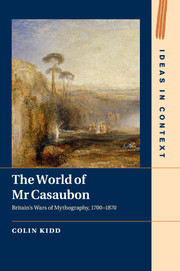Book contents
- Frontmatter
- Contents
- Acknowledgements
- 1 Prologue: Casaubon's Dubious Bequest
- 2 The Key to All Mythologies
- 3 The Legacies of the Ancients in Enlightenment Mythography
- 4 The Obsessions of Jacob Bryant: Arkite Idolatry and the Quest for Troy
- 5 The Dispute of the Orient: Anglo-French Rivalries in an Age of Revolution
- 6 Fish-gods, Floods and Serpent-worship: From Apologetics to Anthropology
- 7 Epilogue: The Keys to All Mythology in 1872
- Index
- Miscellaneous Endmatter
4 - The Obsessions of Jacob Bryant: Arkite Idolatry and the Quest for Troy
Published online by Cambridge University Press: 24 November 2016
- Frontmatter
- Contents
- Acknowledgements
- 1 Prologue: Casaubon's Dubious Bequest
- 2 The Key to All Mythologies
- 3 The Legacies of the Ancients in Enlightenment Mythography
- 4 The Obsessions of Jacob Bryant: Arkite Idolatry and the Quest for Troy
- 5 The Dispute of the Orient: Anglo-French Rivalries in an Age of Revolution
- 6 Fish-gods, Floods and Serpent-worship: From Apologetics to Anthropology
- 7 Epilogue: The Keys to All Mythology in 1872
- Index
- Miscellaneous Endmatter
Summary
Do you not see that it is no use now to be crawling a little way after the men of the last century – men like Bryant – and correcting their mistakes? – living in a lumber room and furnishing up broken-legged theories about Chus and Mizraim?
(Middlemarch, ch. 22)George Eliot's Mr Casaubon was – as we have seen – a composite portrait, drawn not only from Eliot's own imagination but also from a variety of sources known to her. However, the most significant prototype for Mr Casaubon was the dominant mythographer in England during the late eighteenth century, Jacob Bryant. In A New System, or an Analysis of Ancient Mythology (1774–6), Bryant established a persuasive way of channelling the immense variety of pagan legends into a single ‘helio-arkite’ scheme of interpretation. Myths were essentially compounds with two elements, one drawn from memories of the Flood, the other arising in naturalistic fashion from worship of the sun. Bryant's interpretive framework was original, yet built in plausible ways upon pre-existing traditions of mythographical investigation. Notwithstanding the cavils of its critics, orthodox as well as sceptic, Bryant's massive multi-volume work, with upwards of 500 pages in each of its three tomes, had gone into a third edition by 1807. Yet by the time of his death Bryant's magnum opus had also become a byword for misapplied erudition. In particular, it seemed to its critics to belong not to the cutting edge of mythological investigation, but to occupy territory that was, intellectually speaking, an arid wasteland of superficial and unsupported etymologising. If any single work provided the pattern for Casaubon's unfinished ‘Key to All Mythologies’, it was Bryant's New System.
Indeed, Bryant retained considerable name recognition – only in part as a figure of fun – well into the nineteenth century, and his Arkite theories enjoyed a vivid afterlife long after A New System had dropped out of the canon of mainstream mythography. Bryant was still a prominent target for irreligious anthropologists in the early 1870s, when Middlemarch was published.
Bryant was a kind of anti-Midas: every topic upon which he alighted inspired only error. By a further irony, the errors he coined, upheld or propagated were various.
- Type
- Chapter
- Information
- The World of Mr CasaubonBritain's Wars of Mythography, 1700–1870, pp. 111 - 130Publisher: Cambridge University PressPrint publication year: 2016



